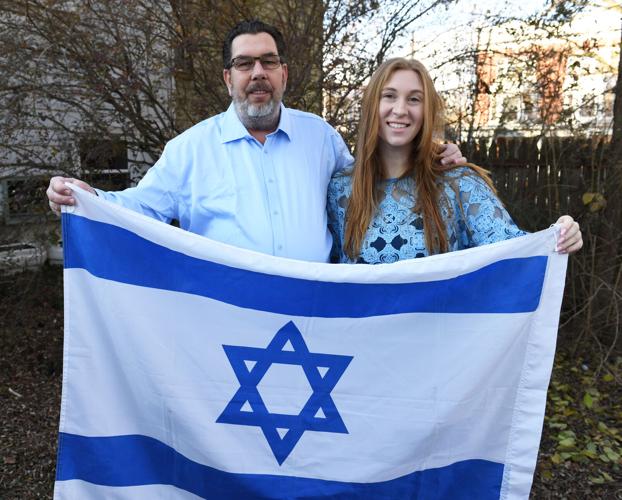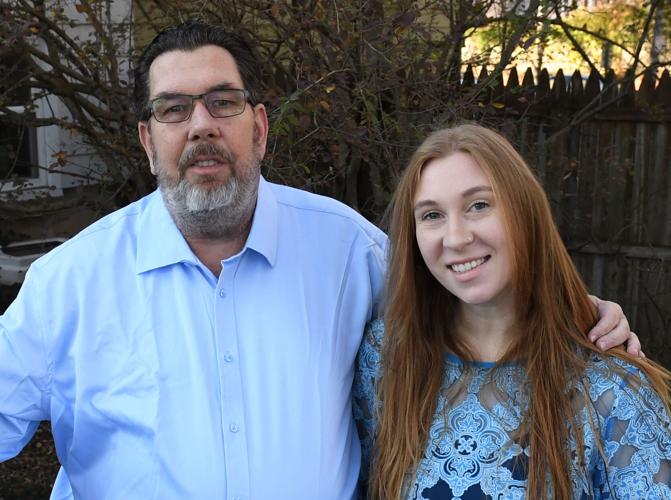Hanukkah 2023 starts after sundown tonight with a bittersweet taste for many local Jews.
The Festival of Lights celebrates dedication and endurance, and the celebration includes fun traditions with singing songs, opening gifts and enjoying delicious food, such as potato latkes, sugary doughnuts and lots of chocolate.
But this year’s eight-day celebration of how one day’s worth of sacred oil miraculously burned for eight days more than 2,000 years ago comes amid renewed fighting in the Mideast after an October attack by Hamas on Israel.
America has seen an 388% increase in antisemitism in the two weeks following the Oct. 7 Hamas invasion of Israel, according to the Anti-Defamation League, an advocacy group. Hatred also has found Muslims. The Council on American-Islamic Relations, an advocacy group, reported a 216% increase in requests for help and reports of bias in the month after the Hamas attack, compared with the same time frame a year ago.
Tensions around instances of hate have sparked fear and resilience, often at the same time, Lancaster County residents said.
For instance, the Jewish community pulled out of ExtraGive Fest + One World Festival on Nov. 17. “We didn’t want protests or to be a distraction,” said Rabbi Jack Paskoff, who leads Congregation Shaarai Shomayim, a reform temple in Lancaster.
“Jews are approaching this holiday with a very different sense,” Paskoff explained. “We are being vigilant.”
One of his congregants agreed.
“I am holding multiple opposing emotions,” said Jaci Hoosier of Mountville. “The entire Jewish world changed on Oct. 7.”
Hoosier’s three children, ages 17, 14 and 12, will celebrate Hanukkah knowing that Hamas still holds Israeli hostages. Still, the family will celebrate with food, presents and songs.
Aron Safran of Lancaster shared his experience balancing joy and sadness.
“Jews and Israelis learned to flip the switch between sorrow and mourning to happiness and celebration many generations ago — we really had no choice but to learn that life must go on despite anything else,” said Safran, who served in the Israeli military during the 1980s.
Safran said a friend in Israel buried his son about three weeks ago, yet he expects to feel joy during Hanukkah.
“In modern Israel, this is exemplified by the switch made between our visiting the graves and families of lost friends and loved ones on Israeli Memorial Day for Fallen Soldiers and Victims of Terror and celebrating like crazy the very next day on Israeli Independence Day,” Safran said.
For Safran’s daughter, Stephanie, it took time to lessen her anxiety after the attack. The younger Safran graduated from Penn Manor High School in 2017 and served two years in the Israeli Defense Forces before returning to the area in 2021 to recover from a back injury. She considers herself an Israeli.
Two soldiers Stephanie Safran trained with in Israel died Oct. 7 at her former military base in Zikim, near Gaza. Another army friend remains hospitalized after being shot at an Israeli music festival where 364 people died.
“I stopped wearing my Star of David necklace for a while because of fear,” said the 24-year-old, who was born in Israel but moved with her family to Lancaster when she was 4. She said she’s encountered instances of antisemitism in Lancaster, in New York and abroad in Amsterdam, where she traveled last month.
Stephanie Safran put the necklace back on a week ago, after deciding “not to cower in fear.” She explained being able to handle the dichotomy of feeling fear for Israel while celebrating the joys of Hanukkah.
“There’s a lot of fear being Jewish,” said Cantor Carol Chesler, the spiritual leader of Temple Beth El, a conservative congregation in Lancaster. Increasing antisemitism is “like a wild bull let out of the pen in a rodeo, roaring its head.”
“For most Jews, our focus is what’s going on in Israel,” Chesler said. Hanukkah “is a fun holiday. You’re eating chocolate, singing songs – it’s very difficult to wrap your head around, to muster up the feeling to celebrate. It’s hard to feel joyful when you are so anxious.”
For Grace Celley, who converted to Judaism in 2015, recent hate toward Jews feels scary.
“I don’t feel safe at my university,” said the 25-year-old, who attends Millersville University. She mentioned swastikas discovered inside and outside of a dormitory. Swastikas were widely used as a symbol of the German Nazi party during the Holocaust.
However, another convert, Melissa Dagen, “decided not to change anything,” she said. She will again display her menorah in the same side window of her house in Manheim Borough and said she feels both fear of antisemitism but also a resolve to celebrate the holiday and her faith. Dagen said she wished her furniture arrangement allowed her to display the candelabra in a more prominent place, such as her front window.
“Part of me wants to be a little but more visible,” she said. As a medical professional, she wears no jewelry during the week but wears her Star of David necklace on weekends.
“Now, more than ever, I want to show who I am and who I choose to be,” said Dagen, who converted to Judaism eight years ago.
Paskoff said he continues to look toward the future for Israel and for local Jews. “I’m personally feeling determined,” the rabbi said. “I’m certainly not depressed. I hope to rediscover the joy.”






![On Israel, antisemitism and the light of Hanukkah [column]](https://bloximages.newyork1.vip.townnews.com/lancasteronline.com/content/tncms/assets/v3/editorial/e/b7/eb7e4f6e-6a14-11ee-bb3d-8740c8354e27/6529bfe81ff11.image.jpg?resize=150%2C200)


